The House of Hanover
The royal dynasty that ruled Great Britain and Ireland from 1714 to 1901. Victorian Britain and Queen Vicky get separate entries, since Victoria spent so long on the throne.
Originated from the Duchy of Brunswick-Lüneburg (also known as Hanover, the largest city in it), in what is now essentially the German state of Lower Saxony.
George I (1714-1727)
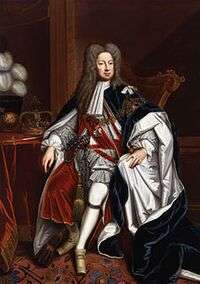
George I (German: Georg) did not become King of Great Britain and Ireland until the age of 54, and had possibly less interest in ruling the country than any other actual monarch before or since. During his early life, he'd served in a couple of wars that had expanded the Holy Roman Empire, married his first cousin. She later cheated on him. Her lover was killed, possibly with George's knowledge and she was placed in a Luxury Prison Suite.
Ascended to the dukedom of Hanover in 1698 on the death of his father. The removal of Catholics from the line of succession to the British throne (56 of them were ahead of his family), and the death of the incumbent first-in-line, rather unexpectedly placed his mother Sophia as heir presumptive to the reigning Queen Anne. Sophia was hardly young and died in 1714, just before Anne herself. George found himself heir and headed for the UK, but got stuck for a while at The Hague due to wind problems.
George, not having been anywhere near close to succeeding to the British throne until during his late forties, did not speak English, found communication with his British ministers difficult, and generally preferred Hanover to Britain anyway. Therefore, during his reign, Parliament became the dominant body in British government and the first "Prime Minister" (a title not yet in formal existence) emerged, Robert Walpole.
Proving that speculation is nothing new...
The South Sea Company held a monopoly on English trade with South America, particularly the Transatlantic Slave Trade, which was really getting going at this time (one of the effects of the War of the Spanish Succession was that Britain obtained the asiento, the exclusive right to sell slaves to Spanish colonies).
It bought a large portion of the British national debt, by selling shares. Engaging in practices that were distinctly dodgy to drive up the price, such as "selling" shares to politicians. The politicians didn't actually pay for them, sold them back, thus increasing the price. There were also false rumours of potential profits.
Other companies joined in. (Some choice example are the company for inventing a wheel for perpetual motion, capital one million, and the notorious company "for carrying on an Undertaking of great Advantage; but nobody to know what it is." The proprietor of the latter company raised the then-huge sum of two thousand pounds in one day, and promptly skipped town.)
By 1720, the price had reached its peak and people were selling en masse. Those who had bought shares on credit saw the price collapse and many ended up bankrupt. The banks had to write off a load of debt they could not get back. Parliament was recalled, investigated and found massive fraud going on. This was probably not the first "bubble" and it certainly wasn't the last.
King George was not directly involved, but the government became rather unpopular as a result.
George was often ridiculed in England for his wooden mannerisms and supposed inability to speak English (he handled royal business in French, and may have picked up the language later in life), but by and large, contemporary accounts held him to be a better choice than the Stuarts.
George II (1727-1760)
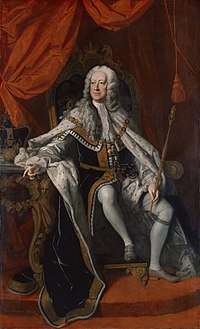
Perhaps best known for the Jacobite rebellion of 1745 when Bonnie Prince Charlie marched a Scottish army as far as Derby before turning back and being defeated at Culloden.
To be fair, he was also the last British monarch to lead an army in battle (at Dettingen, in 1743), at the age of 60 no less.
Also, Britain reformed its calendar in 1752, omitting eleven days to switch from the Julian to Gregorian calendars. The second of September was followed by the fourteenth, and dates were referred to as Old Style or New Style according to which calendar was being used. Most of the Continent had switched some time ago.
The song that became the UK's national anthem, 'God Save The King', was written and first performed during George II's reign – and remains used to this day, as 'God Save The Queen' .
As a point of trivia, Georg August was not only the last British Monarch born outside of Britain but the last hereditary ruler of Hanover to be born any closer than Berlin.
Eventually living to the age of 77, George became at this point the longest-lived monarch the land had ever seen. As holder of this record he was succeeded, as on the throne, by:
George III (1760-1820)
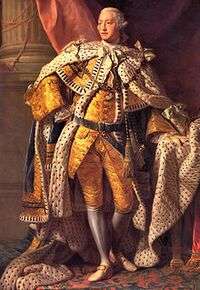
"I glory in the name of Britain".
The grandson of George II (his father Frederick having died young), George III came to the throne aged just 22, and went on to become both the longest-lived and longest-reigning sovereign in British history by this point. The first Hanoverian to have been born in England and raised speaking English, he in fact never visited Hanover in his long life. Unlike his two predecessors, who were mostly interested in their German territories, George's attentions were firmly fixed on Britain; at his coronation speech, he famously proclaimed, "I glory in the name of Briton".[1] He nevertheless also accepted the principle of constitutional monarchy; his occasional fights with Parliament were rarely all that contentious. He took a personal interest in agriculture (fitting, given that Britain's Agricultural Revolution reached its height during his reign), and wrote pamphlets on agriculture under the pseudonym Ralph Robinson. These interests earned him the popular appellation "Farmer George".
Four major events happened during his reign: the American and French Revolutions, the Acts of Union between Britain and Ireland and the Napoleonic Wars. Content to let Parliament run things most of the time (particularly when the Tories were in charge), it's best to just read those articles for further information.
A perhaps atypically-successful family man for a British monarch, George and his queen Charlotte had a happy marriage (despite first meeting only on their wedding day, when he was already King) and 15 children, of whom eleven lived to the age of at least 60. A man of great personal piety (spending hours in prayer daily) and morality (never taking a mistress and abhorring the habits of his brothers and, later, his sons), he is generally remembered as a good king in Britain (the Americans have another perspective, but even then most historians believe him to be Misblamed). It's worth noting that after the USA achieved independence, he commented that "I was the last person to consent to the separation [of America and Britain], but I will be the first to accept the friendship of the United States as an independent power." He opposed Catholic Emancipation, but only because he believed it would violate the coronation oath he took to 'defend the (Protestant) faith'. Alas, he is also remembered for going quite insane (probably due to porphyria), leading to...
The Regency (1811-1820)
In 1811, it was thought best that His Majesty, having gone completely cuckoo (this was not the first time, mind), should be quietly removed from power. His son, the Prince of Wales (Prinny), took over and was the nominal monarch for the next nine years. (It should be noted that from the Civil War onwards, Parliament had been growing in power - over the last century or so it had blossomed. Prinny, thankfully, did not have all that much power.)
The setting of a million historical romance novels. It's something about the tight trousers.
George IV (1820-1830)
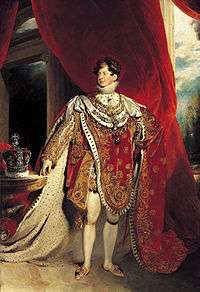
Prinny officially got the job in 1820. Once known as the First Gentleman of Europe, he had largely degenerated into an obese Dirty Old Man whose main preoccupation was depriving his wife, Caroline, of her rights as queen. His daughter and heir, Charlotte, had died in childbirth in 1817, so at least part of his reign was spent watching his brothers scramble to produce a viable heir of the next generation.
The only other remotely noteworthy aspect of George IV's reign was his about-face on the Catholic Question: after being very supportive of Catholic emancipation earlier in his life (and secretly marrying one), George publicly announced his opposition to the Catholic Relief Act of 1829 (which gave Catholics the vote). Fortunately, Parliament forced it through anyway.
A number of early Charles Dickens works are actually set during this time, including Little Dorrit and The Pickwick Papers.
William IV (1830-7)
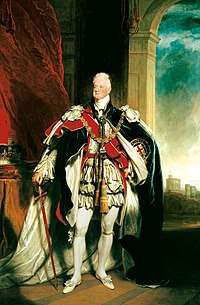
"Sailor Billy", as he was known, was actually the third son of George III (the second son Frederick, or the literal Grand Old Duke of York, had died some years previously) and, as such, originally went into the Navy. William was notorious for his casual manners, not to mention that he preferred to walk rather than take the royal carriage anywhere. He shocked society by openly living with his mistress and acknowledging her children - one of whom was the maternal ancestor of future Prime Minister David Cameron. In his youth, he also sparked political controversy by attacking government policy in the House of Lords, in which he was entitled to sit as the Duke of Clarence; while no-one could have predicted he would become King years later, it did not seem appropriate for a royal.
It was in William's reign that the Reform Act of 1832 was passed (extending the franchise to poor men and fundamentally weakening the power of the House of Lords), along with laws against child labour (although not banning it entirely), the abolition of slavery and the first state provisions for the poor were made.
William IV is of interest for another reason - he remains the last British monarch to actually use his "reserve powers" without the permission of Parliament, in this case appointing a Prime Minister against their will. This wasn't the flourish of remaining monarchical authority it seemed, though, since he actually didn't do this on his own steam but in response to a request from other powerful political figures. Even in the 19th century, the political fuss this act caused showed just how much the reality of the monarch as 'ruler' had been shattered.
Victoria (1837-1901)
William IV outlived both of his legitimate children, so when he died, the Crown came to his niece, Victoria. Her reign was long and eventful; she became both the longest-lived British sovereign (the third time this had occurred in the last five monarchs), still outlived only by the present Queen Elizabeth II, and remains the longest-reigning monarch in British history. See Queen Vicky, Victorian Britain, and Victorian London for more on this period. Her eldest son, Edward VII, marked the beginning of The House of Saxe-Coburg and Gotha (from the surname of Prince Albert), known today as The House of Windsor.
Film
Literature
Live-Action TV
- ↑ Or "Britain"; nobody's quite sure, but either way the point is the same.
